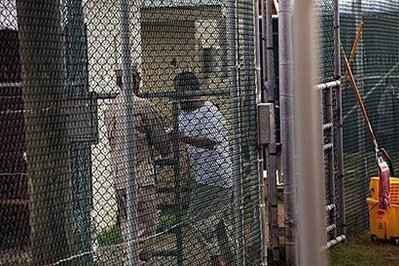The State Department envoy responsible for negotiating prisoner transfers from the U.S. military prison at Guantanamo Bay, Cuba, is resigning.
 The State Department envoy responsible for negotiating prisoner transfers from the U.S. military prison at Guantanamo Bay, Cuba, is resigning, officials said on Monday, even as President Barack Obama is promising a stepped-up push to close the facility.
The State Department envoy responsible for negotiating prisoner transfers from the U.S. military prison at Guantanamo Bay, Cuba, is resigning, officials said on Monday, even as President Barack Obama is promising a stepped-up push to close the facility.
The surprise announcement of Clifford Sloan's departure followed a flurry of detainee repatriations and resettlements, though officials at the State Department and White House had made clear their frustration with the slow handling of such moves by outgoing Defense Secretary Chuck Hagel.
Sloan assumed the post in July 2013 and the State Department said he was stepping down and returning to his Washington law practice after finishing an 18-month commitment.
A senior U.S. official said another factor in Sloan's decision was that the Pentagon "certainly hasn't been as helpful as they could have been" in speeding up the process of sending prisoners home or resettling them in other countries.
Still, Secretary of State John Kerry said in a statement Sloan's "skillful negotiating" led to the transfer of 34 detainees and "with more on the way."
With the detainee population whittled down to 132, several more are expected to be transferred by year-end and that figure could reach low "double digits" as further moves involving "various nationalities" take place in following weeks, the senior official said.
Sloan's resignation, which takes effect on Dec. 31, is not likely to affect transfers already in the pipeline, but it remains to be seen what kind of impact it will have beyond that.
"I'm going to be doing everything I can to close it," Obama told CNN in an interview broadcast on Sunday, renewing a pledge he made to shut the internationally condemned prison when he took office nearly six years ago.
He said keeping the prison open "continues to inspire jihadists" around the world and is "wildly expensive."
But he faces obstacles posed by the U.S. Congress, not least of which is a ban on the transfer of prisoners to the U.S. mainland.
Guantanamo was opened by Obama's predecessor, George W. Bush, after the Sept. 11, 2001, attacks on the United States, to house militant suspects rounded up overseas. Most of the detainees have been held for a decade or more without being charged or tried.
Sixty-four prisoners have been cleared by an interagency review but the problem remains finding ways to send them home or identify other countries that will accept them.